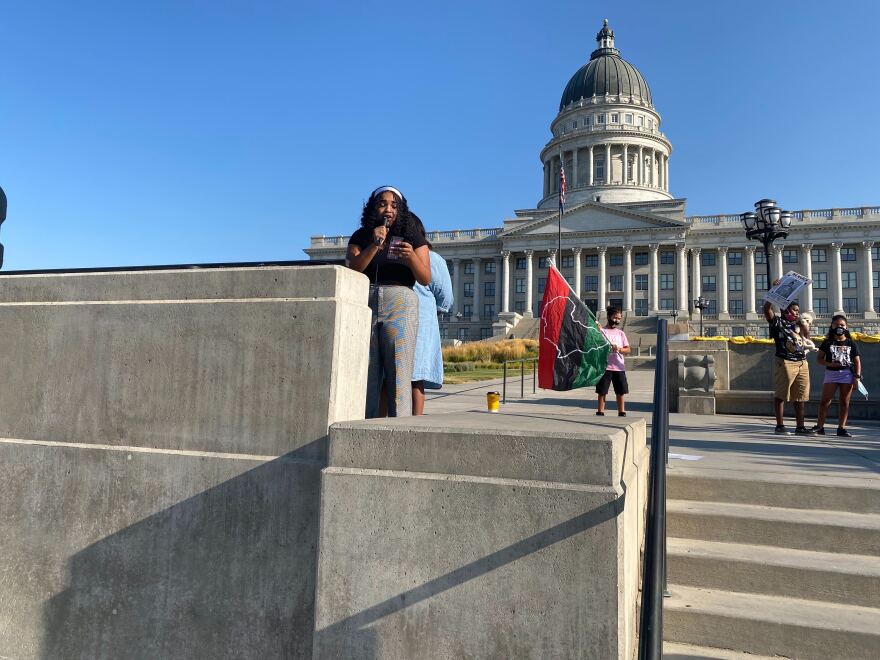More than a hundred people gathered at the steps of the Utah State Capitol building Friday morning to commemorate the 57th anniversary of the 1963 “March on Washington.” Friday also marked 65 years since the lynching of Emmett Till in Mississippi.
Utah’s march was also in solidarity with events across the country honoring the Civil Rights event that ended with Martin Luther King Jr.’s “I Have a Dream” speech. But Friday’s event comes as the state and country continue to grapple with protests against police brutality and for racial justice.
It also comes just days after police in Wisconsin shot Jacob Blake seven times from behind, as he leaned into his vehicle. Blake survived, but is paralyzed from the waist down, and his family said he was handcuffed to the bed in the hospital.
Leaders from Utah’s Black Lives Matter chapters, as well as other advocacy groups, spoke at the event, before marching downtown to the Salt Lake City and County building.
Nevaeh Parker, a 15-year-old student from Ogden, spoke first and recited King’s words, then followed them with her own hopes for the future.

“My dream is that we can all rise above our narrow confines and come together to finish the work that needs to be done,” Parker said. “This — right here, right now — is our history.”
History that Lex Scott, founder of Utah’s Black Lives Matter chapter, said hasn’t shown a lot of improvement for the Black experience in America.

“We passed the Civil Rights Act in 1964, and nothing has changed but the weather,” Scott said. “In 1964, the police would kill us in the streets. In 2020, police are killing us in the streets.”
Scott went on to list the names of African-Americans and people of color killed by police — Darrien Hunt and Dillon Taylor, who were killed by officers in Utah, and even Eric Garner and Tamir Rice.
“I'm sick of memorizing these names,” she said. “I'm sick of the mothers crying in my face. I'm sick of injustice. Let's do something about it. You can protest all day, every day. But unless we pass these bills to hold them accountable, what is this worth? We came out and we held a sign.”
Scott said next, it’s on them to put pressure on lawmakers and ensure bills aimed at police reform become law.
Jacob Siolo, with Pacific Islanders for Black Lives Matter, said he’s tired of arguing about human rights issues.

“We debate the unsheltered, Black Lives Matter — a debate,” Siolo said. “You know what we don't debate in this country? We don't debate the reality that people want to kill us because of what we're protesting.”
Siolo went on to question why the conversation hasn’t been about police firing 34 shots at Bernardo Palacios-Carbajal, or why Blake was handcuffed in the hospital.
But still, he pushed the attendees to not give up hope for their cause.
“We need to remember that hopelessness is the enemy of justice,” he said. “Hope allows us to push forward even when the truth is distorted by the people in power. We share in solidarity with the millions marching today across America. All Black lives matter, forever and always.”




